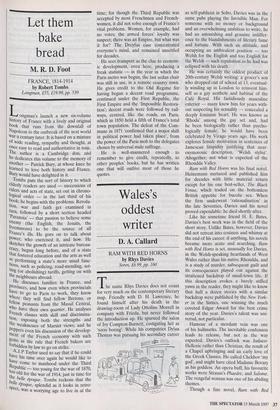Let them bake bread
M. R. D. Foot
FRANCE, 1814-1914 by Robert Tombs Longman, £55, £19.99, pp. 539 Longman's launch a new six-volume history of France with a lively and original book that runs from the downfall of Napoleon to the outbreak of the next world war a century later. It is based on a mixture of wide reading, sympathy and thought, at once easy to read and authoritative in tone. The author is a Cambridge don, and he dedicates this volume to the memory of another — Patrick Bury, at whose knee he learned to love both history and France. Bury would have delighted in it. Tombs puts the sort of history to which elderly readers are used — successions of rulers and acts of state, set out in chrono- logical order — in the last third of his book; he begins with the problems. Revolu- tion, war and faith get examined in turn, followed by a short section headed `Paranoia' — that passion to believe some enemy (the English, the Jesuits, the freemasons) to be the source of all France's ills. He goes on to talk about Power; who exercised it, and how. He sketches the growth of an intricate bureau- cracy, begun long before, and of a state that fostered education and the arts as well as performing a state's more usual func- tions, such as policing, road-mending, set- ting (or abolishing) tariffs, getting on with the neighbours abroad. He discusses families in France, and Provinces, and how even when provincials have to go to Paris to work, they know where they will find fellow Bretons, or fellow peasants from the Massif Central, who have their own quartier. He analyses French classes with skill and discrimina- tion, exposing both the strengths and the weaknesses of Marxist views; and he Peppers even his discussion of the develop- ment of the French economy with such gems as the rule that French bakers are forbidden by law to go on strike. have Taylor used to say that if he could have his time over again he would like to ur,ave come to manhood under the Third Republic — too young for the war of 1870, t!:)0 old for the war of 1914, just in time for the belle époque. Tombs reckons that the belle ePoque, splendid as it looks in retro- sPeet, was a worrying age to live in at the time; for though the Third Republic was accepted by most Frenchmen and French- women, it did not solve enough of France's vital problems. Women, for example, had no votes; the armed forces' loyalty was suspect; there was an Empire, but what was it for? The Dreyfus case concentrated everyone's mind, and remained unsettled for decades.
He sees transport as the clue to econom- ic development, even here, producing a freak statistic — in the year in which the Paris metro was begun, the last sedan chair was still in use, in a remote country town, He gives credit to the Old Regime for having begun a decent road programme, continued under the First Republic, the First Empire and the 'Impossible Restora- tion'; decent roads were followed by rail- ways, centred, like the roads, on Paris, which in 1850 held a fifth of France's total town population. The defeat of the Com- mune in 1871 'confirmed that a major shift in political power had taken place', from the power of the Paris mob to the delegates chosen by universal male suffrage.
He is well-mannered enough to remember to give credit, repeatedly, to other peoples' books, but he has written one that will outlive most of those he quotes.


































































 Previous page
Previous page